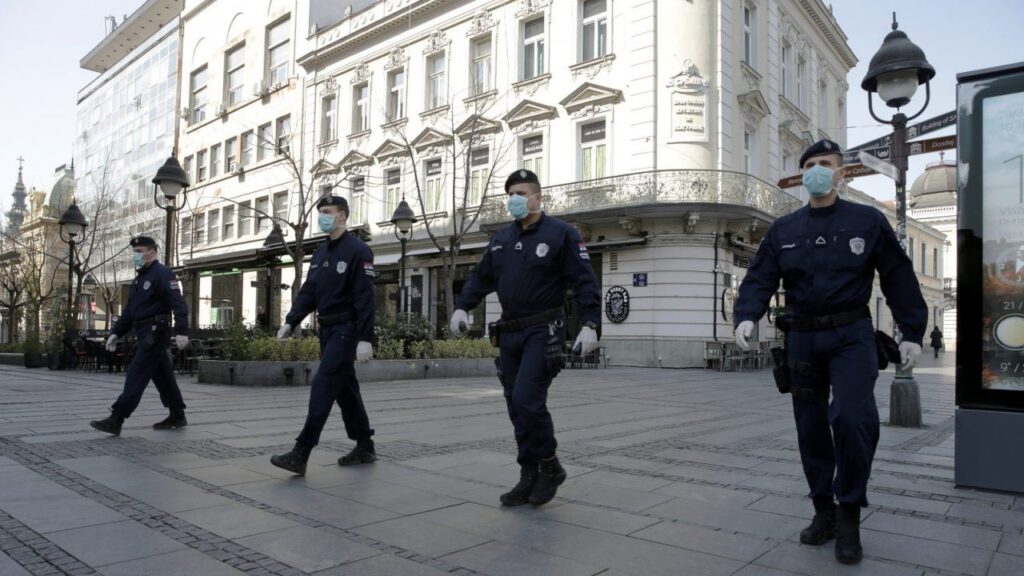COVID-19 in Serbia: elections more important than public health
*This blog is published as part of the regional blogging initiative “Tales from the Region” on the experience of western Balkan countries with the COVID-19 Pandemic, published between 24 June 2020 and 6 July 2020. The initiative is coordinated by Res Publica (North Macedonia), in partnership with the Institute for Democracy and Mediation (Albania), Analiziraj.ba (BiH), KIM Radio (Kosovo), Sbunker (Kosovo) the civic initiative „Ne Davimo Beograd“ (Serbia) and PCNEN (Montenegro).
Author: Igor Todorovic
Serbia’s state leadership, including a group of MDs who are in the forefront in the fight against the spread of the coronavirus, to say the least, ignored the deterioration of the situation until the voting was over.
To understand the actions of the authorities in Serbia after the COVID-19 outbreak, all one needs to do is look at the developments of the last few days. However, data on how many people were infected, died, were tested and have recovered are “centralized”, i.e. can be obtained only from one place and they are not categorized by location. Journalists have complained, especially after the crisis headquarters stopped holding regular press conferences, of not receiving the required information and explanations. It was especially suspicious that the daily number of new confirmed cases during the two weeks leading up to the June 21st elections changed by only a few cases and from May 22 to June 26 it was announced that either no deaths were recorded to be caused by the virus, or up to one person had died per day.
Speculations about whether the data are being glossed-over were brewing until June 22nd, yet there was no talk of changes in the methodology. Then BIRN reported that the national (but not public) Covid19 Information System showed that there were over two and a half times more deaths than reported. Also, according to these data, in many cases, the daily numbers of newly infected persons were several times higher than the numbers reported by the authorities.
COVID drove the campaign
There is no official reaction yet, so the public has all the less trust in those who are most responsible for public health. Some members of the medical team relativized the said discovery, claiming that it is not the same when someone dies from a disease caused by the coronavirus and when a person infected with COVID-19 dies from something else. Until that moment, state officials claimed that the death of every infected person was registered and they even pointed fingers at some countries in the region, implying that others were lying.
In the midst of the pandemic, the President of Serbia, Aleksandar Vucic, did not shy away from such accusations. Moreover, the actions, the struggle and the victory over the virus were the backbone of his campaign for the ruling party.
VIP hotspots
Another indication to the state’s position can be seen from the announcement made on June 23, two days after the general and local elections, stating that wearing masks is being made mandatory in public transport and that the decision takes effect on the same day. “The Government of Serbia will continue to monitor with great attention the development of the epidemiological situation in the coming days and will regularly and timely inform the citizens on everything,” reads the brief text, but without explaining what the epidemiological situation actually is!
Since the lifting of the state of emergency in early May and the resumption of the election campaign, the government has loosened measures and increased the number of people allowed at gatherings. Members of the crisis headquarters assured the public that COVID-19 is weakening. Political rallies were sporadic and mostly small, yet there were twenty thousand spectators at the football match between FC Partizan and FC Crvena Zvezda (FC Red Star). It was probably the biggest event in Europe in the past few months, and more sporting events ensued.
All were held with the blessing of the relevant authorities. Doctors from the crisis headquarters did not publicly oppose it, they even gave their blessings for the euphoric opening and strongly underplayed the hazards. It was later announced that several players were infected, as were tennis players, including Novak Djokovic, who participated in tournaments in Belgrade and Zadar.
If you don’t test the sick, the statistics will be better
During that time, many people with fever and respiratory disorders reported to the media or through social networks that they waited for hours in the so-called COVID clinics and that doctors refused to test them. Some infected people say that no one asked about the people with whom they were in contact, and those who suspected that they were exposed to the virus could not be tested free of charge, at least not without symptoms. On the other hand, there were examples of state institutions sending healthy officials to be tested for no reason, which indicates manipulation of statistical data.

In retrospect, such actions are not surprising. At the end of February, at Vucic’s first press conference with doctors, they were making jokes and assuring the citizens that there was no danger whatsoever. Pediatric pulmonologist and university professor Branimir Nestorovic claimed that the epidemic in China was coming to an end and that estrogen “protected women” and that they “did not die” from the coronavirus. He even told the people not to be afraid of “the funniest virus in history”.
He remained in the crisis headquarters and regularly provoked controversy, for example with statements contrary to the recommendations for protection. On top of that, the rest of the team did not act in unison, and, as a matter of fact, global institutions and other countries didn’t either. From neighbouring Croatia to the World Health Organization. One minute, masks are necessary, then the other they are useless, and no one found it appropriate to explain how gloves protect anyone.
What are we going to do with the kids tomorrow?
A couple of weeks later, Vucic announced that he is introducing a state of emergency and a curfew. Doctors insisted on Thursday that there was no need to close down the schools, and a complete turnaround happened on Sunday evening, March 15. Not on Friday after school, but on the eve of a new school day, educational institutions were closed down. Working parents found themselves at a loss in terms of what to do with their little ones.
The president initially said that older people should not be visited by their families, so as not to inadvertently infect them. He did not have any recommendations for households where three or four generations live. But he soon banned people over the age of 65 from leaving their apartments or house yards in the cities and later introduced going out once a week in the middle of the night to one of the several hundred stores that were purposely open at the time. In rural areas, the age limit was set at 70, with the exception of farmers.
Blank passes for movement
A system of passes has been introduced for farmers and for essential workers. It was envisaged that such a piece of paper would be issued for a certain period of time during the curfew, but the abuses soon began. In short, companies close to the government could work, while some were left stranded. For example, there was a possibility for veterinary laboratories to test samples for coronavirus, but the state would refuse to allow employees to leave their homes. At the same time, some residential buildings construction sites never stopped their operations.
One of the most extreme versions happened in late April before the state of emergency was lifted. In response to the citizens’ protests “Bukom protiv diktature” (Noise Against Dictatorship), initiated by “Ne davimo Beograd” (Don’t Let Belgrade D(r)own) and the Civic Front, hooligans were tasked to light up torches on the roofs of buildings in support of the regime and to chant against the opposition. When the tenants reported one such group and police came to ID them, they released its members because they all had passes allowing them to move during the curfew.
Therefore, we can conclude that discipline did not yield the expected results. While most people stayed at home, with minimal local movement, municipal and city staff activists and employers with access to passes were free to go about their business. The peak of the infection was in the middle of April, during the strictest restrictions. Is there a connection?
Preventing crowds with crowds
Any strengthening of measures to ban movement or even hints or threats of a stricter lockdown brought unrest among the population and caused crowds and migration. It was clear that decisions were made hastily, as in the case of shutting down the schools. Public transport was reduced to discourage movement, and as a result, the buses were overcrowded. Special, working lines were introduced, also exposing people to risk.
Threats to lock down entire cities forced people to migrate abruptly. In the beginning, sudden bans on movement and some rumours sent people out in a rush to buy supplies and fuel.
Once city transport was back on track in Belgrade, a rule was introduced for people to enter only through the front door, and for the driver to open other doors for passengers to exit only after passengers have boarded. In practice, this slowed down travel, forcing a larger number of people to stay indoors for a longer period of time. Thus, there was more physical contact than in a system where all doors are used in both directions.
Dangerous to be outdoors, perfectly safe in sports betting places
At the beginning of April, while the police were well into giving out fines and dispersing the people they would find in the parks, it became news that only then sports betting places and gyms are being closed down. Theories about the connection of their owners with decision-makers were further fueled at the end of the month when the opening of these facilities was announced. Staying in the park or elsewhere outdoors for recreation was still forbidden! However, after the reaction in the public, there was a concession in that field as well.
Students had to abruptly leave dormitories, and some people coming back from abroad were crammed into some of them and left to wait for days for the results of the coronavirus test. In doing so, persons who did not travel together were kept on the same premises, so the risk of infection increased. But that is nothing compared to the military camp set up in Morovic, near the border with Croatia, where Serbian nationals who came by land were initially housed in tents in the winter, without hot water.
Why bother coming back?
Perhaps the biggest drama in the first phase was made by Vucic and other officials due to the large number of people coming back from European and other countries. Not a word about the unprecedented collapse of the world economy, millions of layoffs and loss of personal income. None. According to them, the diaspora invaded Serbia because health care is free here.
The health care system, evidently, met COVID-19 patients without sufficient equipment for a drastically stricter approach to protection and treatment. From the numerous information leaked to the media about inadequate conditions in hospitals, the report of journalist Ana Lalic stood out, and she was arrested for that. She communicated anonymous statements of health workers about the chaos in Novi Sad. There were several cases of arrests and imprisonment for people who stayed abroad and who were not informed at the border at all that they had to stay in self-isolation.
At this point, the other side of the seesaw came up, after everyone started to go back to their usual way of life. State relief and incentives to overcome the economic shock, including a grace period in loan repayments and foreclosures, have partially delayed dealing with the aftermath of an unprecedented crash in the Eurozone and elsewhere. The stimulus in Serbia cannot be compared to more developed areas, but that is exactly why the government could not afford not to support the domestic economy. And the upcoming elections were an equal motive.
All adult citizens who applied for assistance were paid one hundred euros in dinar counter value, and employers received three minimum net monthly salaries per employee. The initial sobering up after the lifting of the state of emergency occurred with restrictions for passengers from Serbia to neighbouring and non-neighbouring countries. Politicians did not miss the opportunity to attribute this to national intolerance. It would not be a surprise if we are yet to feel the health and other types of crises and the scale of the absurdity.
The daily number of new cases went up again after a month above the psychological limit of 100, and immediately afterwards it went over 200. Novi Pazar has already reached maximum capacity, and an emergency situation has been introduced at the local level in several areas.
Maja Gojkovic, the current president of the National Assembly of Serbia, ended up in the hospital with pneumonia after the party’s election victory. The Minister of Defense, Aleksandar Vulin, was also in the crowd with the trumpet orchestra, and later it also turned out that he was infected, as well as some other officials.
Serbia is facing a deep economic crisis. Even without chronic sore-spots, the overflow of the frightening tsunami that has already hit the Eurozone will tip the scales. Due to infections in the collective, local companies are sending entire shifts and teams or all employees to work from home again.
The possibility of progress in the suppressing of coronavirus is directly linked to the trust of the population in their leaders. After the controversial and still incomplete elections, the government found itself without institutional opposition, while trust in doctors from the crisis headquarters is melting.
About the author: Journalist Igor Todorović specializes in finance and energy on a global level. He follows Balkan topics with an equal focus, with an emphasis on transition and overcoming the consequences of war, migration and emancipation. He has participated in several art and humanitarian projects.


